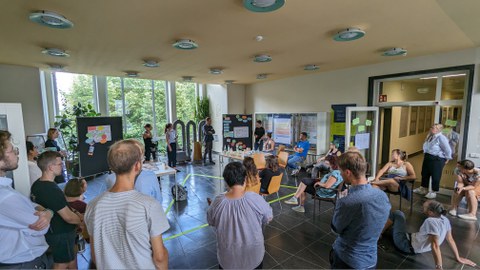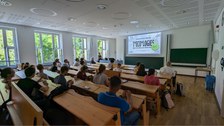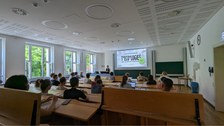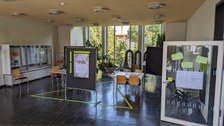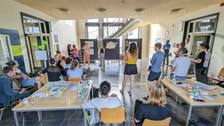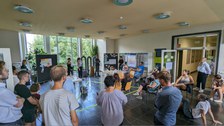Oct 18, 2023
17-18 August 2023: Interdisciplinary Summer School T*ECO*LOGIES - a review
On 17 and 18 August 2023, the Summer School T*ECO*LOGIES took place at the Institute of Energy Technology of the Faculty of Mechanical Engineering in the Merkel Building of TU Dresden. The organisers, Prof. Dr. Cornelia Breitkopf, Professor of Thermodynamics, and Dr. Sandra Buchmüller, Visiting Professor specialising in feminist technology research and design, were overwhelmed by the response to the event. Despite the holiday season and midsummer temperatures, 25 people accepted the invitation to spend two days exploring perspectives on gender, body/neurodiversity and ecology in relation to technology - topics that are not normally central to the engineering sciences, but are of central importance in view of current social and ecological problems. Most of the participants came from the TU Dresden, some also from the TU Chemnitz, the University of Mainz, the University of Cologne, and even an engineer from Shanghai. They brought different experiences and perspectives from mechanical engineering, electrical engineering, biotechnology, applied physics, university didactics in engineering, media informatics, educational and media sciences, history of technology and university research, sociology of technology and the environment, gender and queer studies, theology, science management between society and technology and the non-university promotion of women and girls.
Organisation & Event: Prof. Dr. Cornelia Breitkopf, Dr. Sandra Buchmüller, Annika Leonie Jung (SHK), Mathew Martin (SHK), September 2023
Participants: 25
Program of the summerschool
| 1st Day | 2nd Day |
|---|---|
| Workshop 1: Discovery walks on the main campus of the TU Dresden on gender history and gender present. Organisers: Prof. Dr. Cornelia Breitkopf and Dr. Sandra Buchmüller, TU Dresden |
Workshop 2: Anti-Ableist Technologies: Tactile Practices Organiser:inside: MELT Art and Design Research Duo Ren Loren Britton & Iz Paehr, Berlin |
| Lecture & Discussion Prof. Dr. Cornelia Breitkopf: Gender constructions using the example of thermodynamics (German) |
Workshop 3: Human Nature Technology. Perspectives through Design Organiser: Ines Weigand, Weizenbaum Institute/University of the Arts Berlin |
On the first day, the participants went on various discovery tours of the main campus of the TU Dresden and returned with maps and detailed observations that clearly illustrated, by means of street names, building designations, signs, sculptures, façade ornaments, or even allocated rooms, that the engineering sciences have been dominated by men not only in history, but also in the present. In the afternoon, Prof. Dr. Cornelia Breitkopf showed in her lecture on gender constructions in thermodynamics how historically significant scientists derived arguments from their scientific theories and assumptions as to why women were not suitable for science. The next day, the art and design research duo MELT used the concept of "technoabelism" to illustrate that the production and design of technology always presupposes certain physical and mental abilities of use. The example of Cindy - a woman with amputations below the knees and several limbs on her fingers - and the everyday objects she has redesigned, which are documented on the website "Engineering at home" (http://engineeringathome.org/), illustrated the adaptations users who do not have "normal bodies" have to make. In the third workshop, Ines Weigand, research assistant at the Weizenbaum Institute of the Berlin University of the Arts, used examples such as Agbogbloshie, the rubbish dump made of electric steps in Ghana's capital, the mountains of clothing in the Atacama Desert or microplastics in the oceans to show the global impact of the Western world's product and technology development in the service of consumer capitalism. She used these images to illustrate that what we design affects us back. Feminist approaches, to which she refers, thus no longer separate nature and culture, but speak of our environment and mode of existence in nature-culture, in which we have to take care not only of ourselves, but also of other human and non-human beings and realities. To visualise this symbiosis and relationship of care, at the end of the event all participants received a bottle of algae and a piece of plastic tubing that served to breathe into the algae, which feed on CO2.
Due to the different experiences and backgrounds of the participants and the topics of the Summer School, an exchange across disciplinary, qualification and age boundaries succeeded, which made clear - as the respondents to the subsequent online survey reported back - how important it is to take other perspectives and positions, especially in scientific and research fields such as engineering, whose results have such far-reaching consequences that affect us all - albeit to different degrees.
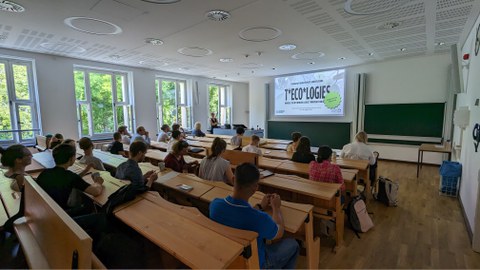
© Summer School T*ECO*LOGIES 2023
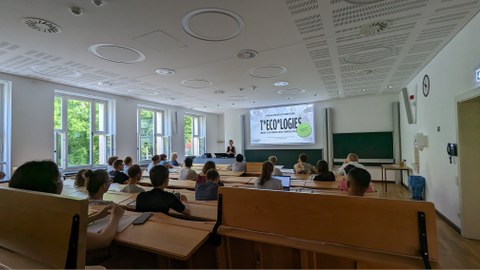
© Summer School T*ECO*LOGIES 2023
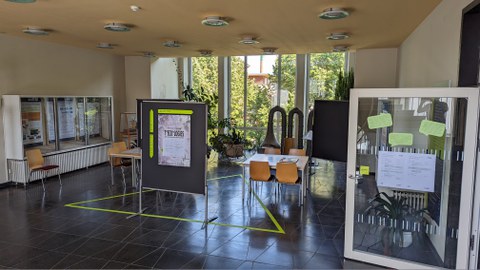
© Summer School T*ECO*LOGIES 2023
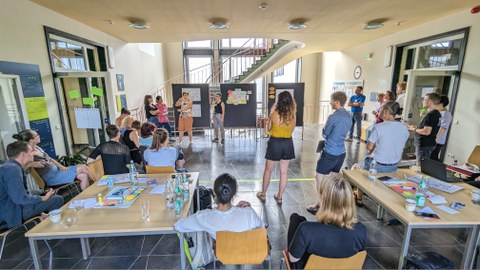
© Summer School T*ECO*LOGIES 2023
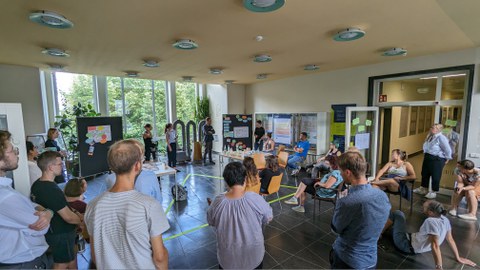
© Summer School T*ECO*LOGIES 2023
Author: Dr. Sandra Buchmüller

